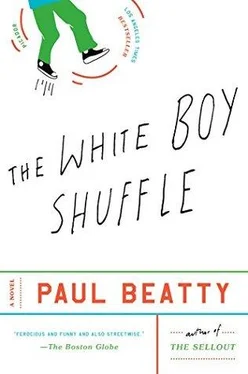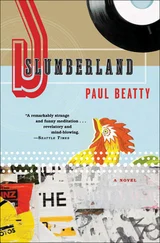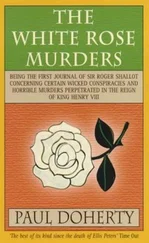Paul Beatty - The White Boy Shuffle
Здесь есть возможность читать онлайн «Paul Beatty - The White Boy Shuffle» весь текст электронной книги совершенно бесплатно (целиком полную версию без сокращений). В некоторых случаях можно слушать аудио, скачать через торрент в формате fb2 и присутствует краткое содержание. Год выпуска: 2001, Издательство: Picador, Жанр: Современная проза, на английском языке. Описание произведения, (предисловие) а так же отзывы посетителей доступны на портале библиотеки ЛибКат.
- Название:The White Boy Shuffle
- Автор:
- Издательство:Picador
- Жанр:
- Год:2001
- ISBN:нет данных
- Рейтинг книги:3 / 5. Голосов: 1
-
Избранное:Добавить в избранное
- Отзывы:
-
Ваша оценка:
- 60
- 1
- 2
- 3
- 4
- 5
The White Boy Shuffle: краткое содержание, описание и аннотация
Предлагаем к чтению аннотацию, описание, краткое содержание или предисловие (зависит от того, что написал сам автор книги «The White Boy Shuffle»). Если вы не нашли необходимую информацию о книге — напишите в комментариях, мы постараемся отыскать её.
The White Boy Shuffle — читать онлайн бесплатно полную книгу (весь текст) целиком
Ниже представлен текст книги, разбитый по страницам. Система сохранения места последней прочитанной страницы, позволяет с удобством читать онлайн бесплатно книгу «The White Boy Shuffle», без необходимости каждый раз заново искать на чём Вы остановились. Поставьте закладку, и сможете в любой момент перейти на страницу, на которой закончили чтение.
Интервал:
Закладка:
“Not really.”
“Alilililililililili!”
I panicked and dashed out of the room, with my classmates and Professor Edelstein close behind. “I can’t believe it — Gunnar Kaufman, the underground neologist, the poet’s poet, right here in my poetry workshop. Only in America.” I felt like I’d been outed and exposed by my worst enemies, white kids who were embarrassingly like myself but with whom somehow I had nothing in common. To prove it I walked through the center of campus and slowly began to undress. Near the School of Engineering I released my sweater to the Boston winds. It sailed like a magic carpet past the trolleys and over the heads and outstretched hands of Professor Edelstein and the students of Creative Writing 104. My shirt, shorts, and underwear followed, sucked into a mini-tornado near the College of Liberal Arts. The clothes spiraled at a dizzying speed with dead leaves and crushed milk cartons. Soon the twister died and they fell to the ground, only to be pounced on like piñata candy by the class.
I continued down Commonwealth Avenue, naked save for sneakers and socks. My black lower-middle-class penis fluttered stiffly in the wind like a weather vane, first to the left, then suddenly to the right. When I reached the vestibule of my apartment building, the campus police closed in on me. I heard Professor Edelstein shout, “It’s okay, he’s a poet. Matter of fact, the best black … the best poet writing today.” The cops instantly backed off. I was protected by poetic immunity. I had permission to act crazy.
I pulled off an officer’s hat and mussed his hair, then skipped up the stairs to my apartment and plopped face down on the couch, my head on Yoshiko’s lap. She rested her textbook on my cheek and with her left hand cleaved the crack of my ass like a hacksaw.
“You all right, baby?”
“Fine. What you reading?”
“Macroeconomics.”
“You don’t mind me here?”
“Nope, just don’t move too much. How was your first class?”
There was a timid knock at the door. “Judge for yourself.” Edelstein entered, followed by Rimbaud, Plath, Ginsberg, Eliot, and the rest of the poetry canon, bashfully trying to avert their eyes by gazing at Coach Shimimoto’s watercolor prints on the walls.
“Yoshiko, this is my creative writing class. Class, this is my wife, Yoshiko.” Shy hellos, then whispers all around.
“He’s married? Oh, fucking cool. I’m in Gunnar Kaufman’s pad and he’s naked, intense.”
“Gunnar, a few of your classmates want to know if they can keep your clothes as mementos. You know, they might be worth something one day.”
“I don’t think one sleeve of a torn T-shirt is going to be worth much.”
“What we really came by to say was that we feel you have to publish a collection of your work. Why don’t you compile a manuscript, and I’ll take care of the publishing end? I know some big-wig Yalies in New York, and you should have a decent advance in a week and a book by spring. The people, your people, need to see your work.”
Yoshiko tapped her macroeconomics book on my head, which I interpreted to mean “Say yes.”
“Okay, I’ll give you some things.”
“What about a title?”
“How about, ummm, Watermelanin. ”
“Gunnar, you know, this is going to change your life.”
The door burst open, then quickly slammed shut.
“Damn, nigger, every time I come over, Yoshiko got her hand halfway up your ass. But you know what they say — ‘Once you go Asian, there’s no other persuasion.’” It was Scoby, not bothering to knock, standing in the middle of the living room oblivious to the other uninvited guests and talking loudly to make himself heard over his stereo headphones. “What this shit about your life going to change?”
“He’s going to publish a book of poems.”
“I can speak for myself, Yoshiko. She’s right, I’m going to publish a book of poems.” Yoshiko subtly plucked a hair from my anus. “Ow.”
Professor Edelstein motioned for his class to open their notebooks and take notes. My visitors cleared some space, and Scoby sat on the floor Indian-style, playing an imaginary vibraphone. I guessed he was still listening to Lionel Hampton.
“Publishing a book of poems don’t change your life as much as it changes everyone else’s life. Sad as your shit is, fools going to be jumping off roofs and shit. I heard if you commit suicide your freshman year, your roommate automatically gets a perfect grade-point average. That true?”
“You thinking of committing suicide?”
“I don’t know, maybe. Depends on what your poems say.”
“What you doing tonight?”
“I don’t know. Ain’t shit to do in this town.”
“What do you mean, Boston’s a great party town,” Negritude broke in, looking up from her notes and batting her eyelashes in my direction.
Yoshiko threw her macro book at the interloper, hitting her squarely in the jaw. “Get your slothful, fey, hippy behinds out of our apartment, now!”
The class hustled out of the room, a stream of Japanese curse words escorting them to the door.
“Gunnar, don’t make me have to hurt one of these stupid white bitches.”
“Slothful, fey? Honey, your English is getting really good. What are we going to do tonight?”
* * *
There wasn’t a whole lot of nigger nightlife in Boston, much less any fun spots for Japanese nationals. When we first arrived, we cruised the local bars, garish nightspots crammed with white people sloshing beer on one another and singing corny white pop hits from the 1980s. Yoshiko must have punched a hundred guys who tried to pick her up with the line from the Vapors’ big hit, “I think I’m turning Japanese, I really think so.” Looking for a more austere environment, we tried the gay spots in the South End. Our favorite hangout was Club Tribadism, a gay/lesbian bar with the best jazz jukebox in the city. The patrons tolerated us until one night Nicholas and another patron got into a fight over whether Billie Holiday’s “Strange Fruit” could be deciphered as a paean to a mentally ill queer. After a little sword fighting with pool cues, we were driven into the street and banished from Club Tribadism forever. Scoby got in the last word when he proclaimed that Mel Torme was the ugliest dyke he’d ever seen.
By October we had finally figured out that the colored folks lived in Roxbury. Roxbury was an old, hilly community practically inaccessible by public transportation. For the most part it was a desolate place, with little to offer except decent basketball competition and a few juke joints. Our regular spot was Oscar’s Onyx, a musty blues bar at the top of the hill on Mission Avenue. Friday nights brothers in platform shoes would get into knife fights, slashing the air with their eyes closed like orchestra conductors. Scoby’s barbs always roused the crowd, “You stupid hick-ass bean-eating stiletto-carrying Cooley High niggers is still wearing leather jackets and talking about ‘Stand back, sucker, fo’ I cut cha.’ Niggers probably think the Black Panthers is still active.” Later on male and female strippers with names like Chocolate and Brutus walked from table to table, soliciting dollar bills in exchange for a feel. Yoshiko and Scoby had a thing for a potbellied she-male stripper named Smattering of Applause. Smattering of Applause rolled his hips and fondled his tits, and when she bent over to claim her hard-earned tips, hairy butt to the audience, Yoshiko and Scoby would pelt her rear end with balled-up dollar bills. I liked the place because the bartenders wrapped napkins around the beer bottles before they handed them to you and could never adequately explain why. “Habit,” they said. The problem was that every night wasn’t Friday night. On weekdays, while Scoby and Yoshiko did their homework, I had nothing to do. Scoby suggested I join a club.
Читать дальшеИнтервал:
Закладка:
Похожие книги на «The White Boy Shuffle»
Представляем Вашему вниманию похожие книги на «The White Boy Shuffle» списком для выбора. Мы отобрали схожую по названию и смыслу литературу в надежде предоставить читателям больше вариантов отыскать новые, интересные, ещё непрочитанные произведения.
Обсуждение, отзывы о книге «The White Boy Shuffle» и просто собственные мнения читателей. Оставьте ваши комментарии, напишите, что Вы думаете о произведении, его смысле или главных героях. Укажите что конкретно понравилось, а что нет, и почему Вы так считаете.












